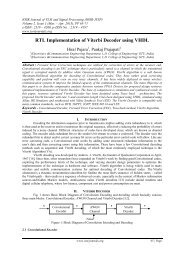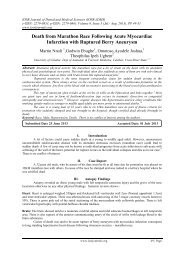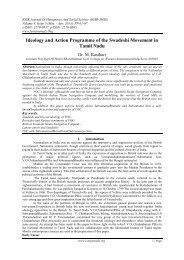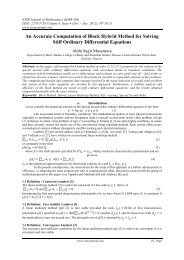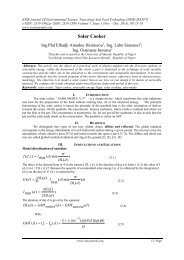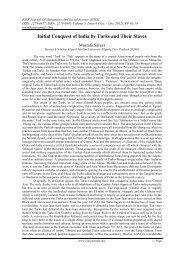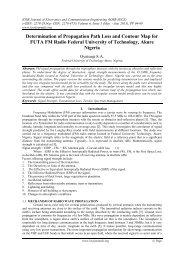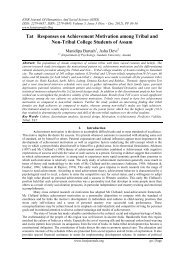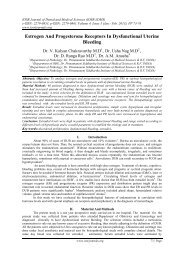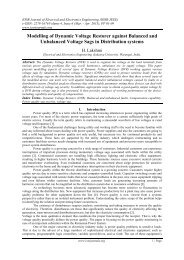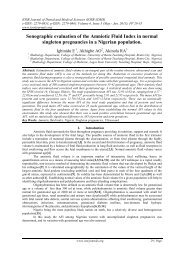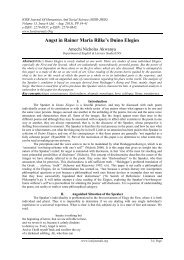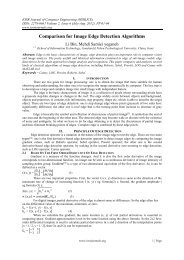Design Compatibility of Classroom Furniture in Urban and ... - IOSR
Design Compatibility of Classroom Furniture in Urban and ... - IOSR
Design Compatibility of Classroom Furniture in Urban and ... - IOSR
You also want an ePaper? Increase the reach of your titles
YUMPU automatically turns print PDFs into web optimized ePapers that Google loves.
The Impact Of Corporate Governance And Leadership On Entrepreneurship Development In Nigeria<br />
implement by way <strong>of</strong> <strong>in</strong>struct<strong>in</strong>g the subord<strong>in</strong>ates, enthusiastically, motivat<strong>in</strong>g, encourag<strong>in</strong>g <strong>and</strong> guid<strong>in</strong>g them<br />
towards the achievement <strong>of</strong> the enterprises goals <strong>and</strong> objectives.<br />
Colley, Doyle, Logan & Stett<strong>in</strong>ius (2004) posit that, leadership is a social <strong>in</strong>fluence <strong>in</strong> an<br />
organizational sett<strong>in</strong>g, the effect <strong>of</strong> which is relevant to or has an impact upon the achievement <strong>of</strong> organizational<br />
goals.<br />
Lawal (1993) sees leadership as the process <strong>of</strong> <strong>in</strong>fluenc<strong>in</strong>g others to work will<strong>in</strong>gly towards an<br />
organizations goal with confidence <strong>and</strong> keenness.<br />
Effective leadership as earlier mentioned is a key factor <strong>in</strong> the life <strong>and</strong> success <strong>of</strong> an organization.<br />
Obviously, there are many factors <strong>in</strong>volved <strong>in</strong> successful leadership. Many are difficult to measure, some are<br />
even hard to identify. In develop<strong>in</strong>g a pr<strong>of</strong>ile <strong>of</strong> leadership, it is important to remember that simply be<strong>in</strong>g <strong>in</strong><br />
managerial position does not make a person a leader. What assumptions does the manager make about the<br />
behavior <strong>of</strong> his/her subord<strong>in</strong>ates? What is the relationship between assumptions <strong>and</strong> the types <strong>of</strong> power a<br />
manager may use? Here, the pr<strong>of</strong>ile <strong>of</strong> leadership considers the idea that be<strong>in</strong>g a leader is not a s<strong>in</strong>gle role but a<br />
group <strong>of</strong> important roles that managers play <strong>in</strong> the life <strong>of</strong> an organization.<br />
Gannon (1977) <strong>in</strong> the work <strong>of</strong> Weber (1949), states that, <strong>in</strong> the past, a manager was automatically<br />
thought to be a leader. The manager did not need any formal tra<strong>in</strong><strong>in</strong>g whatsoever <strong>in</strong> the area <strong>of</strong> leadership for it<br />
was assumed that subord<strong>in</strong>ate automatically followed his orders. He states further that, a leader possesses power<br />
by virtue <strong>of</strong> his position, <strong>and</strong> power is the ability to give comm<strong>and</strong>s that must be accepted.<br />
Gradually, the importance <strong>of</strong> leadership was recognized, because subord<strong>in</strong>ates frequently disobeyed the<br />
comm<strong>and</strong>s <strong>of</strong> superior. As put forward by Mull<strong>in</strong>s (2005) from the work <strong>of</strong> Barnard (1930) gives new def<strong>in</strong>ition<br />
<strong>of</strong> leadership as the ability <strong>of</strong> a superior to <strong>in</strong>fluence the behaviour <strong>of</strong> subord<strong>in</strong>ates <strong>and</strong> persuade them to follow<br />
a particular course <strong>of</strong> action. Currently, managers view leadership no longer as a right <strong>of</strong> <strong>of</strong>fice but rather, as a<br />
skill that can <strong>and</strong> must be learned <strong>in</strong> order to motivate subord<strong>in</strong>ates to be productive.<br />
Corporate as a concept, is an adjective that is shared by all <strong>in</strong> a group. As such, it is a group <strong>and</strong> not<br />
just an <strong>in</strong>dividual. Entrepreneurial organization that is managed by just one <strong>in</strong>dividual cannot be properly<br />
described as be<strong>in</strong>g corporate, it must have a group <strong>of</strong> <strong>in</strong>dividuals head<strong>in</strong>g the enterprise to be tagged corporate<br />
(Ogundele, 2007).<br />
Governance is considered as that organ <strong>of</strong> small or big organization or even the larger society, which is<br />
charged with the responsibility for controll<strong>in</strong>g resources, <strong>of</strong> all types, with<strong>in</strong> the spheres <strong>of</strong> its <strong>in</strong>fluences, <strong>and</strong><br />
also hav<strong>in</strong>g power <strong>of</strong> rulership over the human <strong>and</strong> material resources, <strong>of</strong> the organization or community<br />
(Ogundele, Alaka <strong>and</strong> Balogun, 2005).<br />
Omonzejie (2005) considers governance as an act, fact, <strong>and</strong> manner <strong>of</strong> controll<strong>in</strong>g, rul<strong>in</strong>g <strong>and</strong> direct<strong>in</strong>g<br />
the public affairs <strong>of</strong> a city, country, etc. He notes further that, governance as a process or the art <strong>of</strong> govern<strong>in</strong>g is<br />
a body vested with the power <strong>and</strong> authority to ma<strong>in</strong>ta<strong>in</strong> security, peace <strong>and</strong> stability by mak<strong>in</strong>g <strong>and</strong> enforc<strong>in</strong>g<br />
conventional <strong>and</strong> fundamental law <strong>in</strong> a given state or society.<br />
Enabunene (2005) postulates that governance connotes the manner <strong>in</strong> which government governs the<br />
territory <strong>and</strong> people it juristically control. That is, governance is the exercise <strong>of</strong> political power to move a<br />
nation's affairs which encompasses all the state's <strong>in</strong>stitutional <strong>and</strong> structural arrangements, decision-mak<strong>in</strong>g<br />
process, <strong>and</strong> implementation capacity, <strong>and</strong> relationship between government <strong>of</strong>ficial <strong>and</strong> the public. He notes<br />
that governance, therefore, consists <strong>of</strong> a nation's system <strong>of</strong> politics <strong>and</strong> its <strong>in</strong>terconnection <strong>of</strong> public<br />
adm<strong>in</strong>istration <strong>and</strong> law.<br />
Accord<strong>in</strong>g to Keasey, Thompson & Wright, (2005) corporate governance, is a term that scarcely<br />
existed before the 1990s, now universally <strong>in</strong> vogue wherever bus<strong>in</strong>ess <strong>and</strong> f<strong>in</strong>ance are discussed. The subject<br />
has spawned consultancies, academic degrees, encyclopedias, <strong>in</strong>numerable articles, conferences <strong>and</strong> speeches.<br />
Almost all the OECD Nations are currently revis<strong>in</strong>g their corporate governance or have recently done so while,<br />
the establishment <strong>of</strong> a viable corporate governance system has become a priority objective for emergent<br />
economics from Lat<strong>in</strong> American to Ch<strong>in</strong>a. In the midst <strong>of</strong> so much <strong>in</strong>terest, the underly<strong>in</strong>g issues <strong>of</strong> the subject<br />
are always <strong>in</strong> danger <strong>of</strong> be<strong>in</strong>g swamped. Moreover, s<strong>in</strong>ce good governance, like `fair trade' <strong>and</strong> `free<br />
competition' is an abstraction that comm<strong>and</strong>s near-universal respect but diverse <strong>in</strong>terpretation; it has also<br />
become the dest<strong>in</strong>ation board for a b<strong>and</strong>wagon carry<strong>in</strong>g those who would, <strong>in</strong> fact, take the corporation <strong>in</strong> myriad<br />
directions.<br />
They further argued that, not merely does the term corporate governance carry different <strong>in</strong>terpretations,<br />
its analysis also <strong>in</strong>volves diverse constra<strong>in</strong>ed by legal, regulatory, f<strong>in</strong>ancial, economic, social, psychological <strong>and</strong><br />
political mechanism which are themselves sometimes substitutes <strong>and</strong> sometimes complements. Academic<br />
researchers, predom<strong>in</strong>antly com<strong>in</strong>g from a s<strong>in</strong>gle subject background will typically explore the operation <strong>of</strong><br />
merely a subset <strong>of</strong> these <strong>and</strong> then <strong>in</strong> the context <strong>of</strong> the priorities <strong>of</strong> their own discipl<strong>in</strong>e. This <strong>in</strong>evitably means<br />
that research on the subject becomes Balkanized <strong>and</strong> less accessible.<br />
Olayiwola (2010) states that corporate governance as a concept may be viewed at least from two<br />
perspectives - the narrow <strong>and</strong> the broad perspectives. The narrow view is concerned with the structure with<strong>in</strong> a<br />
www.iosrjournals.org<br />
48 | Page



